| |||||
| Centuries: | |||||
|---|---|---|---|---|---|
| Decades: | |||||
| See also: | Other events of 2024 Years in North Korea Timeline of Korean history 2024 in South Korea | ||||
The following is a list of events from the year 2024 in North Korea .
| |||||
| Centuries: | |||||
|---|---|---|---|---|---|
| Decades: | |||||
| See also: | Other events of 2024 Years in North Korea Timeline of Korean history 2024 in South Korea | ||||
The following is a list of events from the year 2024 in North Korea .
| Photo | Position | Name |
|---|---|---|
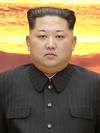 | General Secretary of the Workers' Party of Korea | Kim Jong Un |
 | Chairman of the Standing Committee of the Supreme People's Assembly | Choe Ryong-hae |
 | Premier of North Korea | Kim Tok-hun |
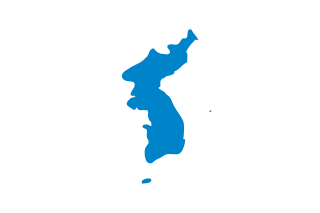
Korean reunification is the aspired unification of North Korea and South Korea into a singular Korean sovereign state. The process towards reunification of the peninsula while still maintaining two opposing regimes was started by the June 15th North–South Joint Declaration in June 2000, was reaffirmed by the October 4th Declaration in October 2007 and the Panmunjom Declaration in April 2018, and the joint statement of United States President Donald Trump and North Korean leader Kim Jong Un at the Singapore Summit in June 2018. In the Panmunjom Declaration, the two countries agreed to work to officially end the Korean conflict in the future.
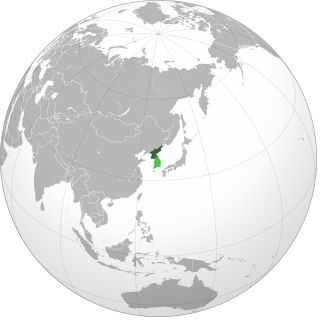
North Korea has a military nuclear weapons program and, as of 2024, is estimated to have an arsenal of approximately 50 nuclear weapons and sufficient production of fissile material for six to seven nuclear weapons per year. North Korea has also stockpiled a significant quantity of chemical and biological weapons. In 2003, North Korea withdrew from the Treaty on the Non-Proliferation of Nuclear Weapons (NPT). Since 2006, the country has conducted six nuclear tests at increasing levels of expertise, prompting the imposition of sanctions.

The Korean conflict is an ongoing conflict based on the division of Korea between North Korea and South Korea, both of which claim to be the sole legitimate government of all of Korea. During the Cold War, North Korea was backed by the Soviet Union, China, and other allies, while South Korea was backed by the United States, United Kingdom, and other Western allies.
The Sunshine Policy is one of the approaches for South Korea's foreign policy towards North Korea.
Kim Ki-nam was a North Korean official. He served as Vice Chairman of the Workers' Party of Korea, and Director of the Propaganda and Agitation Department from 1989 until 2017, responsible for coordinating the country's press, media, fine arts, and publishing to support government policy. He was also a vice-chairman of the Committee for the Peaceful Reunification of the Fatherland, in which capacity he led numerous visits to the South, and served several terms in the Supreme People's Assembly, to which he was first elected in November 1977.

Formerly a single nation that was annexed by Japan in 1910, the Korean Peninsula has been divided into North Korea and South Korea since the end of World War II on 2 September 1945. The two governments were founded in the two regions in 1948, leading to the consolidation of division. The two countries engaged in the Korean War from 1950 to 1953 which ended in an armistice agreement but without a peace treaty. North Korea is a one-party totalitarian state run by the Kim family. South Korea was formerly governed by a succession of military dictatorships, save for a brief one-year democratic period from 1960 to 1961, until thorough democratization in 1987, after which direct elections were held. Both nations claim the entire Korean Peninsula and outlying islands. Both nations joined the United Nations in 1991 and are recognized by most member states. Since the 1970s, both nations have held informal diplomatic dialogues in order to ease military tensions.

Kim Jong Un is a North Korean politician who has been supreme leader of North Korea since 2011 and the leader of the Workers' Party of Korea (WPK) since 2012. He is the third son of Kim Jong Il, who was the second supreme leader of North Korea, and a grandson of Kim Il Sung, the founder and first supreme leader of the country.
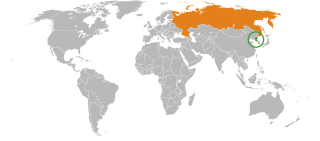
North Korea–Russia relations are the bilateral relations between Russia and North Korea. The Soviet Union was the first to recognize North Korea on October 12, 1948, shortly after the proclamation, as the sole legitimate authority in all of Korea. The Soviet Union supported North Korea during the Korean War. North Korea was founded as part of the Communist bloc, and received major Soviet military and political support. The comprehensive personality cult around North Korea's ruling family was heavily influenced by Stalinism. China and the Soviet Union competed for influence in North Korea during the Sino-Soviet split in the 1960s, as North Korea tried to maintain good relations with both countries.

The Arch of Reunification, officially the Monument to the Three-Point Charter for National Reunification, was a sculptural arch located south of Pyongyang, the capital of North Korea. It was opened in August 2001 to commemorate Korean reunification proposals put forward by Kim Il Sung. Made of concrete, the arch straddled the multi-laned Reunification Highway leading from Pyongyang to the Korean Demilitarized Zone. The arch appeared on postage stamps issued in 2002, 2015, 2016, and 2021. The monument was demolished in January 2024.

Ryu Mi-yong was the chairwoman of the North Korean Chondoist Chongu Party. She was a standing committee member of the 10th Supreme People's Assembly. She was known as a defector from South Korea to the North.
Events in the year 2011 in North Korea.
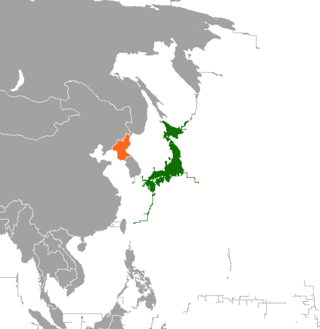
Japan–North Korea relations refers to international relations between Japan and North Korea. Relations between Japan and North Korea have never been formally established, but there have been diplomatic talks between the two governments to discuss the issue of kidnapped Japanese citizens and North Korea's nuclear program. Relations between the two countries are severely strained and marked by tension and hostility. According to a 2014 BBC World Service poll, 91% of Japanese people view North Korea's influence negatively, with just 1% expressing a positive view; the most negative perception of North Korea in the world.

The death of Kim Jong Il was reported by North Korean state television news on 19 December 2011. The presenter Ri Chun-hee announced that he had died on 17 December at 8:30 am of a massive heart attack while travelling by train to an area outside Pyongyang. Reportedly, he had received medical treatment for cardiac and cerebrovascular diseases, and during the trip, Kim was said to have had an "advanced acute myocardial infarction, complicated with a serious heart shock". However, it was reported in December 2012 by South Korean media that the heart attack had instead occurred in a fit of rage over construction faults in a crucial power plant project at Huichon in Chagang Province.
The following lists events that happened in 2013 in the Democratic People's Republic of Korea. In 2013, tensions between North Korea and South Korea, the United States, and Japan escalated because of United Nations Security Council Resolution 2087, which condemned North Korea for the launch of Kwangmyŏngsŏng-3 Unit 2. The crisis was marked by increased rhetoric by the new North Korean administration under Kim Jong-un and actions suggesting imminent nuclear attacks against South Korea, Japan, and the United States.
The following lists events that happened in 2012 in North Korea.
In the year 2017, North Korea was involved in the 2017 North Korea crisis, along with other events. The country conducted a nuclear test in September, and several missile tests throughout the year. One of these was the country's first successful test of an intercontinental ballistic missile (ICBM), Hwasong-14. Two missiles were launched over Hokkaido in the Japanese archipelago, in August and in September 2017.
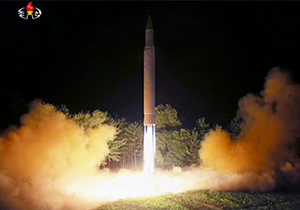
The 2017–2018 North Korea crisis was a period of heightened tension between North Korea and the United States throughout 2017. The crisis began early in 2017 when North Korea conducted a series of missile and nuclear tests that demonstrated the country's ability to launch ballistic missiles beyond its immediate region, suggesting their nuclear weapons capability was developing at a faster rate than had been assessed by U.S. intelligence. Both countries started exchanging increasingly heated rhetoric, including nuclear threats and personal attacks between the two leaders, which, compounded by a joint U.S.–South Korea military exercise undertaken in August and North Korea's sixth nuclear test in September, raised international tensions in the region and beyond and stoked fears about a possible nuclear conflict between the two nations. In addition, North Korea also threatened Australia twice with nuclear strikes throughout the year for their allegiance with the United States.

The 2021–2023 North Korean missile tests are a series of North Korean missile tests in 2021, 2022, and 2023. North Korea conducted a record number of tests in 2022, including the first test over Japanese territory since 2017.
The following is a list of events from the year 2023 in North Korea.